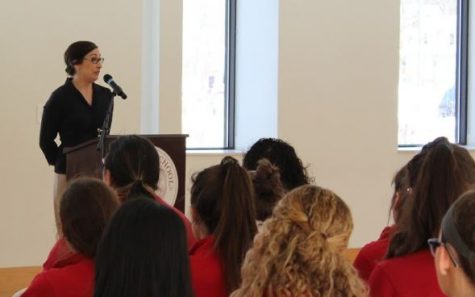How to Hit Reset on the School Year and Get Back on Track
Whether you’re a new or veteran Montrosian, another school year, a new interim, or a new week provides a new start for everyone. If you find the prospect of managing your classes with soccer or the school play (not to mention the 17 clubs you probably signed up for at the Activities Fair) somewhat intimidating, that’s why I’m here. If you’ve been here for a number of years and think that you have it all down to a science, you may want to think again. I’ve compiled a list of tips and tricks for a good start to a school year for those of you who struggle with or have worries about organization, commitment, risk-taking, relaxing, perfectionism, scheduling, personal time, and everything in between.
Tip 1: Be organized and reorganize when necessary: Set aside a binder for each class you have, and put some dividers in it. My label suggestions include Notes, Handouts/Classwork, Homework, Tests/Quizzes, Extra Paper. For classes like English and History, I add an Essays/Papers section, and for Science, Post Labs. If you want, put book covers on your textbooks so you know they’re yours. Write your name in smaller soft bound books in case they get lost. At the end of class, write down your homework in your Montrose Planner ™. If it’s to be posted online, check the website as close to 4 o’clock as you can, and write it down. If you REALLY want to go crazy with organization (cough, @ me, cough), color coordinate your binders with your textbooks with your notebooks.
Tip 2: DON’T PROCRASTINATE: “Don’t put off tomorrow what you can do today.” Easier said than done, I know, but this is the worst habit you can form, and the younger you start, the worse it will be later on. Set your priorities straight, and put all events and important dates (test, ballet recital, away game, essay due, family party, etc) on a calendar in a place you can see everyday to keep deadlines, checkpoints and times when you need to work ahead in mind. If you struggle with time management, set a timer for how long you think an assignment should take (or how much time the teacher tells you to spend), and move on to another assignment when the timer goes off. If you are done with all your work but didn’t finish an assignment, go back to work on it, but don’t spend too much time. For long-term assignments like papers and projects, plan out all the steps you need to take to complete it on the first night you get it assigned. Budget your time night by night so you don’t save it all for the last minute. The same thing goes for tests – study for a short time each night. Cumulative, longer-term review will stick in your mind better (and longer) than last-minute cramming. Short, 20-45 minute blocks of time work best because people are most motivated at the beginning and end of a study session, but lose focus in the middle of longer sessions, and so don’t remember information as well. And remember, teachers are your best resource! They appreciate when a student is eager to better understand or learn more about a certain topic, and they can help a lot with your performance in and management of the class.
Tip 3: Don’t bite off more than you can chew: This is pretty basic, but even I still have trouble with it. And I’ve been here for seven (7) years. That’s a fairly solid chunk of time. So if you feel overwhelmed, make a list of the plethora of clubs and activities you’ve signed up for, and pick no more than your top three choices. Bam, there are your extra-curriculars for the year. If the ones you’ve chosen require a high level of commitment, consider knocking it down to your top two. On the other hand, if they are low-commitment, you could choose four, maybe five, but I do not recommend exceeding this limit. It just won’t end well. For best results, choose a healthy mix of high and low, seasonal and year-round commitment activities.
Tip 4: Know your limitations as well as your strength:. This one also ties back to tip 3, but especially upper-schoolers should take heed. Once you have the option of choosing your own classes, be wise. If you know that history is not one of your stronger suits, then it may not be the best idea to go for AP. At the same time, don’t be afraid to take risks: If you think you’re ready for an Honors or AP course in a subject, go for it. You’ll learn more about yourself and acquire and strengthen a number of skills in the process. At the same time, don’t overdo it, especially if you like playing sports or participating in theater or clubs. Do what you can handle, while challenging your talents and tenacity. If there’s one thing you remember after glazing over this paragraph, it’s this: please don’t take Every AP Class Possible. Just… don’t.
Tip 5: One word: sleep: The right amount of sleep is extremely important for many reasons, such as your brain’s development, your physical health, how you function in school the next day, and your mood. Aim for at least 7 and at most 10 hours of sleep per night. Your brain and body will thank you.
Tip 6: Make some time for yourself: The catch-phrase of one of my good friends is, “Hey, take it easy.” And wise words those are. You may be caught up in homework or in the thick of a sports season, but you can easily lose yourself in it all. Another one of my good friends journals every day before going to bed. This is a really useful tactic to better knowing and growing closer to yourself, but if you don’t have the time for journaling, then I recommend at least taking the time each day to reflect on the good and parts, what you should continue, and what you can do better from now on. And self-care? Really boosts self-confidence. Trust me on this one.
Tip 7: The perfect is often the enemy of the good: Don’t get caught up in the little things. “Zoom out,” as Dr. Bohlin often says, and view things for how they are. One failed test, or a string of failed tests, or even a class you fared poorly in, has very, very little importance in the grand scheme of life. When you’re hyper-focused on getting everything perfect, or you let the expectations of others carry importance or pressure you, you stress out far too much and collapse under the burden you place on yourself when even the inconsequential “little things” don’t go to plan. Let loose a little bit. Take your 30-second, or 30-minute, dance party. Bake cookies. Read Harry Potter. Find a hobby. Take your little brother out to ice cream. Have a family game night. Go to the movies with friends. Write a letter to your big/little sister. Try out some yoga. Work hard, but don’t work too hard. Take the time to enjoy all the wonderful traditions and everyday interactions of Montrose. Spend time alone, with your friends, and with your family. Appreciate the memories as they happen, and don’t forget them.
Getting a good start or a new restart for academic success requires organization, but the key to making a year good is to recognize joy and seize the opportunities that lie before you.
















